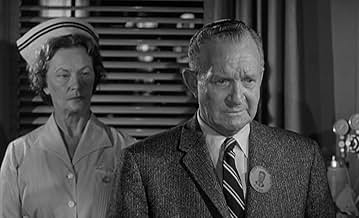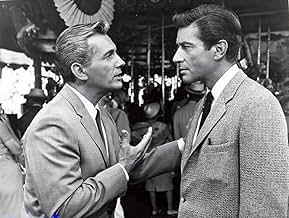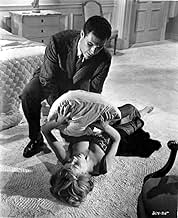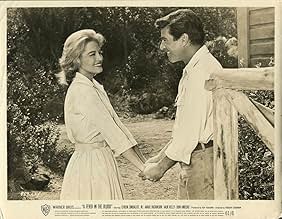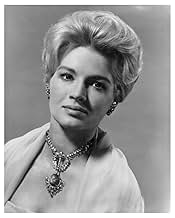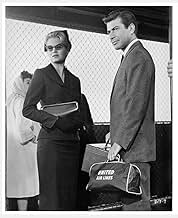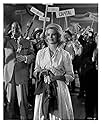Ajouter une intrigue dans votre langueThe murder of a socialite leads to a sensational trial, with a close governor's race hanging on its outcome.The murder of a socialite leads to a sensational trial, with a close governor's race hanging on its outcome.The murder of a socialite leads to a sensational trial, with a close governor's race hanging on its outcome.
- Réalisation
- Scénario
- Casting principal
Al Bain
- Gubernatorial Convention Attendee
- (non crédité)
Eddie Baker
- Commuter
- (non crédité)
Frank Baker
- Courtroom Spectator
- (non crédité)
Fern Barry
- Northridge Delegate
- (non crédité)
Avis à la une
A Fever In the Blood is a nice little package of a movie, and I don't mean this is a negative or condescending way. It has fairly low ambitions and achieves them nicely. It's a product of the tail end of the studio system, and was directed by the very able Vincent Sherman. The plot concerns political intrigue in contemporary (as of 1961) California. I saw the movie so long ago don't remember the details well but do remember being impressed by the performances, much stronger than I expected from such actors as Efrem Zimbalist, Jr., Jack Kelly and Don Ameche. The ending was both predictable and highly satisfying. I recommend the film to those who want to see what studio film-making looked like when the studios were on their last legs, and for those curious about Hollywood's take on the American political system in the early, still optimistic sixties. There were a lot of much bigger and more ambitious films from the same time that are much better known--Advise and Consent and The Best Man come to mind--but A Fever In the Blood can hold its own in its modest way, especially as entertainment. It's not as thought-provoking as the bigger, more prestigious films from the same era but it has a retro charm all its own is easy to watch and plays fair with the viewer.
"Fever in the Blood," a 1961 film, was directed by Vincent Sherman and starred Jack Kelly, Efrem Zimbalist, Jr., Herbert Marshall, Jesse White, Angie Dickinson, Carol O'Connor, and Don Ameche.
Kelly is a DA, Zimbalist a Judge, and Ameche the current state senator, and they all want to run for governor. A high-profile murder case might be just the ticket, and DA Callahan (Kelly) jumps at the opportunity, with Leland Hoffman (Zimbalist) the presiding judge.
You'd think an old pro like Vincent Sherman would have known better than to let these actors play to the top row of the balcony, but the acting for the most part was way over the top, with most actors speaking at the top of their lungs. The result gives the film a very old-fashioned feel.
This isn't an A cast, but it is a likable one. A little more subtlety in the direction would have made for a less bombastic presentation.
Kelly is a DA, Zimbalist a Judge, and Ameche the current state senator, and they all want to run for governor. A high-profile murder case might be just the ticket, and DA Callahan (Kelly) jumps at the opportunity, with Leland Hoffman (Zimbalist) the presiding judge.
You'd think an old pro like Vincent Sherman would have known better than to let these actors play to the top row of the balcony, but the acting for the most part was way over the top, with most actors speaking at the top of their lungs. The result gives the film a very old-fashioned feel.
This isn't an A cast, but it is a likable one. A little more subtlety in the direction would have made for a less bombastic presentation.
I couldn't put this movie down once I started watching it on TCM tonight (I missed the beginning but I assume TCM is playing it to commemorate Efrem Zimbalist's passing almost 2 weeks ago). In the first place, the star-studded cast lived up to their billing with great acting, even Angie Dickinson, who often falls flat on acting skill but always comes through with sexuality and downright feminine attractiveness. In this case, she brought appropriate sexual tension that was not over-played, and really brought on her acting chops. I thought the then-relatively unknown Carroll O'Connor really stood out in his first (albeit minor) big-screen role as a political adviser. His acting was strong, competent, and confident, in a way that portended a successful future career on both the small and large screens. Even in this minor role you could sense a strong presence from Carroll.
There are a lot of twists to this plot: a senator's wife (Angie Dickinson) who still pines for a man (Efrem Zimbalist, Jr.) she never stopped loving before marrying the senator (Don Ameche), but she had to forget about Efrem because he was married to an invalid wife at the time, although the invalid wife had subsequently passed away (without any further hints as to whether they had an affair when he was still married). And he just happens to be the judge in a trial being prosecuted by an ambitious man (Frank Kelly) against a former governor's nephew, and Frank will stop at nothing to gain his party's backing to run for governor. The powers in the political parties come into play as backing is sought, and gained, and lost, while the power players jockey for the best candidates.
Meanwhile, the senator has returned home from Washington, D.C. to run for the governorship that he feels entitled to, in order to stack the state delegation and earn his party's nomination for president. But the senator has a secret, a heart condition that may prevent him from realizing his goal of the ultimate public service to his country.
Now, toss in the fact that the judge has political aspirations of his own, and you have a lit fuse waiting to go off. Political intrigue and subterfuge play a big part in the plot. But neither the great cast and acting or these complicated twists and turns are what makes this movie so good and believable. The courtroom drama is highly technically accurate and believable, the actors are believable, the technical issues behind the objections by the lawyers, and the subsequent override or sustainment by the judge is based on real-life considerations, including the biggest twist of all, which you will have to watch to find out. This is just a valid and highly accurate and technical examples of real-life courtroom proceedings that will have you believing in the plot and its complexities.
Something that struck me about this movie was the way graphic sex was discussed so openly in the courtroom. The deceased in her brief death scene at the beginning of the movie was dressed very provocatively, and it was revealed in the coroner's testimony that she had had multiple sex partners (4, to be exact) in the 24 hours leading up to her death, leaving one's imagination to consider the gruesome and graphic details of how the coroner had determined this information. This kind of subject was still fairly taboo at the time, even on the big screen, and while it may have been an accurate courtroom detail lending credibility to the stark courtroom realities portrayed so well in the movie, it comprised a surprisingly salacious and shocking addition to the plot, especially considering that it was really irrelevant to the flow of the case and the movie. Contrast that with the fact that the viewer is left wondering whether Angie's and Efrem's characters had had an affair while he was still caring for his invalid wife, especially since their romantic interest in each other plays such a large part in the script. That coyness with their relationship just didn't match well with the brutal directness of unnecessarily portraying a nymphomaniac, which was obviously added simply for shock value and reality creds. But that was really just one of only two minor discrepancies with the script.
The other discrepancy would be the conviction of a man for a murder he didn't commit based on an elderly woman's testimony identifying him as a man she briefly saw outlined in her headlights at night from at least 50 feet away, leaving the scene of the murder. There were no fingerprints to back it up, no motive except for an unproven allegation that the husband had previously attacked her with a knife, and an unsuccessful attempt to imply he committed the murder because his mistress was pregnant (though this attempt was never completed). There was just no strong cross examination of the old woman's testimony, and anyone who has ever watched 'My Cousin Vinny' knows how easy it is to destroy weak eyewitness testimony like that, especially in a murder case where someone's life hangs in the balance, and especially since the whole case was based on circumstantial evidence. So that was the one weak point in the court case, which was otherwise brilliantly scripted, set up, and played out.
Overall, I really enjoyed this movie and the great acting that helped pull it off, the two weak points detracted very little from the overall effect. I was struck very strongly with the back-and-forth in the courtroom, and found myself thinking again and again that whoever wrote the courtroom script had real and in-depth courtroom experience and had great skill in accurately putting it together. It wasn't just realistic, it was intelligently- and well-put together. A very good movie.
There are a lot of twists to this plot: a senator's wife (Angie Dickinson) who still pines for a man (Efrem Zimbalist, Jr.) she never stopped loving before marrying the senator (Don Ameche), but she had to forget about Efrem because he was married to an invalid wife at the time, although the invalid wife had subsequently passed away (without any further hints as to whether they had an affair when he was still married). And he just happens to be the judge in a trial being prosecuted by an ambitious man (Frank Kelly) against a former governor's nephew, and Frank will stop at nothing to gain his party's backing to run for governor. The powers in the political parties come into play as backing is sought, and gained, and lost, while the power players jockey for the best candidates.
Meanwhile, the senator has returned home from Washington, D.C. to run for the governorship that he feels entitled to, in order to stack the state delegation and earn his party's nomination for president. But the senator has a secret, a heart condition that may prevent him from realizing his goal of the ultimate public service to his country.
Now, toss in the fact that the judge has political aspirations of his own, and you have a lit fuse waiting to go off. Political intrigue and subterfuge play a big part in the plot. But neither the great cast and acting or these complicated twists and turns are what makes this movie so good and believable. The courtroom drama is highly technically accurate and believable, the actors are believable, the technical issues behind the objections by the lawyers, and the subsequent override or sustainment by the judge is based on real-life considerations, including the biggest twist of all, which you will have to watch to find out. This is just a valid and highly accurate and technical examples of real-life courtroom proceedings that will have you believing in the plot and its complexities.
Something that struck me about this movie was the way graphic sex was discussed so openly in the courtroom. The deceased in her brief death scene at the beginning of the movie was dressed very provocatively, and it was revealed in the coroner's testimony that she had had multiple sex partners (4, to be exact) in the 24 hours leading up to her death, leaving one's imagination to consider the gruesome and graphic details of how the coroner had determined this information. This kind of subject was still fairly taboo at the time, even on the big screen, and while it may have been an accurate courtroom detail lending credibility to the stark courtroom realities portrayed so well in the movie, it comprised a surprisingly salacious and shocking addition to the plot, especially considering that it was really irrelevant to the flow of the case and the movie. Contrast that with the fact that the viewer is left wondering whether Angie's and Efrem's characters had had an affair while he was still caring for his invalid wife, especially since their romantic interest in each other plays such a large part in the script. That coyness with their relationship just didn't match well with the brutal directness of unnecessarily portraying a nymphomaniac, which was obviously added simply for shock value and reality creds. But that was really just one of only two minor discrepancies with the script.
The other discrepancy would be the conviction of a man for a murder he didn't commit based on an elderly woman's testimony identifying him as a man she briefly saw outlined in her headlights at night from at least 50 feet away, leaving the scene of the murder. There were no fingerprints to back it up, no motive except for an unproven allegation that the husband had previously attacked her with a knife, and an unsuccessful attempt to imply he committed the murder because his mistress was pregnant (though this attempt was never completed). There was just no strong cross examination of the old woman's testimony, and anyone who has ever watched 'My Cousin Vinny' knows how easy it is to destroy weak eyewitness testimony like that, especially in a murder case where someone's life hangs in the balance, and especially since the whole case was based on circumstantial evidence. So that was the one weak point in the court case, which was otherwise brilliantly scripted, set up, and played out.
Overall, I really enjoyed this movie and the great acting that helped pull it off, the two weak points detracted very little from the overall effect. I was struck very strongly with the back-and-forth in the courtroom, and found myself thinking again and again that whoever wrote the courtroom script had real and in-depth courtroom experience and had great skill in accurately putting it together. It wasn't just realistic, it was intelligently- and well-put together. A very good movie.
Efrem Zimbalist, Jr. heads an all-star cast about the fever of politics, those running for office, and how those use others in their quest for getting what they want, no matter the cost. The film begins with a murder of a housewife, who's been straying. The district attorney, played by "Maverick" star Jack Kelly, has aspirations of running for Governor and means to get a conviction to help his chances of winning. Judge Efrem presides the case and has thoughts on running for governor as well. Senator Don Ameche even wants to be governor so he can stay in office while going back to his roots. The case gets very interesting quick, when the viewer knows more than they do - that they have the wrong man. They think the husband did it. For such a underrated film compared to Advise and Consent, this was a very well-made and enjoyable film, with a stellar cast, including also Angie Dickinson, who married Don Ameche, only because Efrem was already married. (She must have always loved him.) But when Efrem's wife died, she became more disenchanted with her marriage and filled with what if. Character actors Herbert Marshall and Jesse White costar, along with TV stars Parley Baer and Carroll O'Connor, in his movie debut. And the more I see of Efrem in movies, the more I like him; he always embodies the voice of reason and common sense. But more than that, he exudes a warmth not usually found in handsome leading actors. And he is still with us today, at the age of 95. A sign of a life well lived. "A Fever in the Blood" showcases good actors as politicians immersed in their worlds and being pitted against each other, all vying for the position of one. Who will be governor? Who deserves it? Watch and see for yourself.
I watched this recently on TCM. I had always liked the actors - Jack Kelly (perhaps most famous for Maverick where he and James Garner shared the honors), Efrem Zimbalist, Jr., Angie Dickinson, Don Ameche (and a host of character actors from Jesse White to Carroll O'Connor).
This is a movie about politics in a state in mid-20th century America. The ambitions of three men to become Governor: the current U.S. Senator, a prominent state court judge in the largest city in the state, and the famous District Attorney from that state. Their party lost the last election for Governor - they have reason to believe their party will succeed this time around. Each wants the job - very much.
Kelly plays (wonderfully) a man with a poor slum background - he's risen to be the D.A., he is aggressive, articulate, driven. His life has risen to this point - he wants the Governorship desperately - a loving wife, two happy children in his 1950s suburban home - he feels he's got to move up.
Zimbalist is the product of a wealthy background - he rose naturally to be a judge - his wife was an invalid a long time - then died. He has no children - no particular interest except fishing alone. He is lonely, and says repeatedly that he seeks the Governorship out of interest, to give his life more meaning. He lives year-round in the posh residential suite at the nicest hotel in the biggest city of the state.
Ameche is the current U.S. Senator - in middle age, he won the love of a beautiful blonde woman (Dickinson) who had been in love with Zimbalist (who was married to his invalid wife). Ameche is insecure, childless, deeply cynical, fast thinking, and far older than his wife. He suffered a heart attack the previous year - and wants desperately to win the adoring love of his wife - feeling that if he defeats her former love (Zimbalist), he'll have proved something.
Three smart men - all in the same party - and one job they seek. The screenwriters do a wonderful job of focusing this ambition upon a murder trial - over which Zimbalist presides - and Kelly is the prosecutor. And the defendant in that murder trial is ... the nephew of the former Governor of their party.
Possible - and actual - deals of alliance - offers, rejections, reneging on those deals - create the twists and turns of this political drama.
The movie is deeply cynical - sometimes I felt too much so. (I was sometimes out of sync with the movie - and felt that the characters' actions were not so unjust - or unfair - than the movie wants us to think).
It's a film about character, about ambition, about modern politics - in the last 1/4 of the movie, it goes off the rails repeatedly - with crazy turns and twists that seem implausible and wild - and yet the movie is BIG, the twists and turns remarkable - its ambition to show America the world of modern politics very admirable - even if sometimes too moralistic.
I loved watching it - it's exciting, fresh, the performances are just great (not only by Zimbalist, Kelly, Ameche and Dickinson - but by all the actors).
I suspect if you get the chance, you'll really like it - and remember it.
This is a movie about politics in a state in mid-20th century America. The ambitions of three men to become Governor: the current U.S. Senator, a prominent state court judge in the largest city in the state, and the famous District Attorney from that state. Their party lost the last election for Governor - they have reason to believe their party will succeed this time around. Each wants the job - very much.
Kelly plays (wonderfully) a man with a poor slum background - he's risen to be the D.A., he is aggressive, articulate, driven. His life has risen to this point - he wants the Governorship desperately - a loving wife, two happy children in his 1950s suburban home - he feels he's got to move up.
Zimbalist is the product of a wealthy background - he rose naturally to be a judge - his wife was an invalid a long time - then died. He has no children - no particular interest except fishing alone. He is lonely, and says repeatedly that he seeks the Governorship out of interest, to give his life more meaning. He lives year-round in the posh residential suite at the nicest hotel in the biggest city of the state.
Ameche is the current U.S. Senator - in middle age, he won the love of a beautiful blonde woman (Dickinson) who had been in love with Zimbalist (who was married to his invalid wife). Ameche is insecure, childless, deeply cynical, fast thinking, and far older than his wife. He suffered a heart attack the previous year - and wants desperately to win the adoring love of his wife - feeling that if he defeats her former love (Zimbalist), he'll have proved something.
Three smart men - all in the same party - and one job they seek. The screenwriters do a wonderful job of focusing this ambition upon a murder trial - over which Zimbalist presides - and Kelly is the prosecutor. And the defendant in that murder trial is ... the nephew of the former Governor of their party.
Possible - and actual - deals of alliance - offers, rejections, reneging on those deals - create the twists and turns of this political drama.
The movie is deeply cynical - sometimes I felt too much so. (I was sometimes out of sync with the movie - and felt that the characters' actions were not so unjust - or unfair - than the movie wants us to think).
It's a film about character, about ambition, about modern politics - in the last 1/4 of the movie, it goes off the rails repeatedly - with crazy turns and twists that seem implausible and wild - and yet the movie is BIG, the twists and turns remarkable - its ambition to show America the world of modern politics very admirable - even if sometimes too moralistic.
I loved watching it - it's exciting, fresh, the performances are just great (not only by Zimbalist, Kelly, Ameche and Dickinson - but by all the actors).
I suspect if you get the chance, you'll really like it - and remember it.
Le saviez-vous
- AnecdotesFirst credited feature film role for Carroll O'Connor, who portrays Matt Keenan.
- GaffesLeland holds up the large tape recorder take-up reel to Dan without first winding the rest of the tape onto it, or even taking it out of the machine.
- Citations
Senator Alex S. Simon: If you read my statement carefully, you'll note that I left myself a loophole. A course I recommend to any man who dedicates his life to living off the taxpayer.
- ConnexionsReferenced in Feud: Pilot (2017)
Meilleurs choix
Connectez-vous pour évaluer et suivre la liste de favoris afin de recevoir des recommandations personnalisées
- How long is A Fever in the Blood?Alimenté par Alexa
Détails
- Date de sortie
- Pays d’origine
- Langue
- Aussi connu sous le nom de
- Groznica u krvi
- Lieux de tournage
- 11500 Sepulveda Blvd., Mission Hills, Comté de Los Angeles, Californie, États-Unis(Eden Memorial Park - where the police start chasing the gardener)
- Société de production
- Voir plus de crédits d'entreprise sur IMDbPro
- Durée1 heure 57 minutes
- Couleur
- Rapport de forme
- 1.66 : 1
Contribuer à cette page
Suggérer une modification ou ajouter du contenu manquant

Lacune principale
By what name was A Fever in the Blood (1961) officially released in Canada in English?
Répondre

